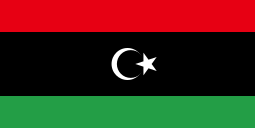1960 Libyan general election
General elections were held in Libya on 17 January 1960.[1]
 |
|---|
| This article is part of a series on the politics and government of Libya |
|
|
|
Legislature
|
|
Judiciary
|
|
|
|
Conduct
The country was divided into 55 constituencies for the election.[2] The majority of constituencies were contested by two or more candidates,[2] although as political parties were banned at the time, all candidates were independents. It was the first election in which secret balloting was used nationwide, as previously it had been confined to urban areas.[2]
Results
Prime Minister Abdul Majid Kubar and all other ministers were re-elected, but the Speaker of the Parliament Salim al-Qadi lost his seat.[2] Following the elections, al-Qadi was appointed Minister of Education, replacing Bubakir Naama, who became Governor of Tripolitania.[2] Ahmed al-Hasairi replaced Ibrahim Bin Shaban as Minister of Defence, whilst Bin Shaban was appointed as "Ambassador at large".[2] Minister of Economics Rajab Bin Katu became Minister of Health, swapping portfolios with Mohammed Bin Othman.[2] Abd al-Hamid Daibani remained Minister of Justice, Nasr al-Kizza remained Minister of Communications and Wahbi al-Bouri remained Minister of State.[2]
References
- Nohlen, D, Krennerich, M & Thibaut, B (1999) Elections in Africa: A data handbook, p527 ISBN 0-19-829645-2
- Keesing's Contemporary Archives, p17344